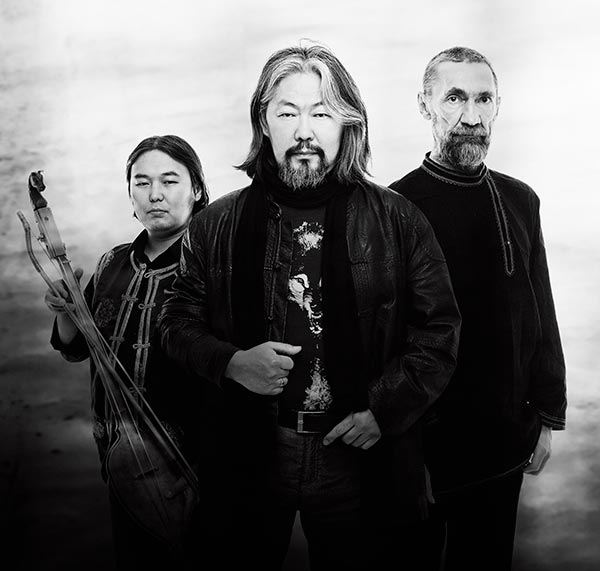 |
|
Tuvan musician Albert Kuvezin (center) and his band, Yat-Kha, have performed in China since the 1990s. [Photo provided to China Daily] |
After experiments with mixing traditional music with rock since the early 1980s, he brought his music to the West in 1993, performing at various festivals and forums in Berlin and Potsdam.
"At that time, we didn't know exactly what to do but tried to be ourselves," recalls Kuvezin.
"There was good reaction from the audiences after our first concert there. They were very excited. I think we were an exotic thing for them."
Kuvezin, 51, will come to Beijing to perform at the Ai World Music Festival, which will be held from July 9 to 11.
Other headliners will include Moroccan-American musician Hatim Belyamani and Chinese guzheng player Chang Jing.
Kuvezin will perform some Tuvan traditional songs with his own interpretation and some songs written by him.
Russian journalist and music critic Artemy Troitsky once said, "There are two unique voices on Earth right now; they belong to Pavarotti and Kuvezin."
Kuvezin has earned praise as a master of khoomei, or the throat-singing technique, which allows a singer to produce multiple tones at once.
Diverging from the traditional Tuvan khoomei, however, he has developed his own way, which he calls kanzat kargyraa.
"Each style of throat singing has its own variation. They all come from nature and originally they were imitations of natural sounds," he says, adding that the singing depends on mentality-connected more to meditation than to technique.
"Depending on the songs, I can imagine various pictures, including my homeland landscapes."
Kuvezin's family is musical, but not professional musicians.
His father plays button accordion and balalaika, and his mother plays seven-string guitar and mandolin. His sister plays piano and his daughter is studying at the College of Arts in his hometown, Kyzyl, to be a choir conductor.
As a boy, Kuvezin was dropped from the school choir because he really couldn't sing like the rest of the kids. That started his longtime battle with the "conventional" music of his home country.
He started to play in bands at school as a teenager by simply copying Russian and Western music.
After music studies at Kyzyl and in Ekaterinburg, Russia, Kuvezin played various instruments like guitar, bass, dopshuur, piano, jaw harp and balalaika.
His musical experiments started when he began working in a national ensemble with acclaimed singers of Tuvan traditional music.
His taste for rock music has been shaped by his teenage discovery of records by Deep Purple and Joy Division.
A founding member of the traditional Tuvan group Huun-Huur-Tu in 1991, Kuvezin left a year later to create his own band, Yat-Kha, with the goal of combining traditional Tuvan throat singing with rock 'n' roll.
"I always paid attention to sounds and effects used by rock musicians. First I was a rock musician and when I got interested in traditional music and throat singing, I tried to find an organic mixture of rock and traditional music," he adds.
With Yat-Kha, he has released dozens of albums, all of which contain different music styles, sounds and arrangements.
Kuvezin's old band, Huun-Huur-Tu, will do a China tour from Aug 15 to Sept 15. Bringing Yat-Kha to China is also on Kuvezin's agenda this year.
Since visiting China in 1998 to perform at a music festival in Hong Kong, Kuvezin has performed in the country several times as a solo artist and with Yat-Kha.
"Our musicians love to perform here. Personally, I like the Chinese instrument guzheng (Chinese zither) very much," he says.
"I have done something for Tuvan and Asian music. I have developed my own ideas, found my own sound and helped young musicians from Siberia. But I can do more and want to continue on my path as a musician and sound producer."
Related:
|
|
|
|
|
|
|
|
